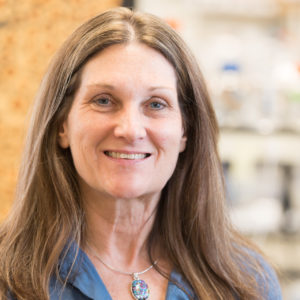Three faculty members in the Department of Microbiology, Immunology, and Pathology have been named 2019-20 U.S. Fulbright Scholars, receiving support for research projects in Spain, Brazil, and Australia.
Each year, the U.S. Fulbright Scholar Program offers nearly 470 teaching, research, or combination teaching/research awards in over 125 countries, aiming to recognize and promote the critical relationship between educational exchange and international understanding.
Fulbright Scholars 2019-20
Claudia Gentry-Weeks

The World Health Organization projects that by 2050, 10 million people could die per year from diseases caused by antibiotic-resistant bacteria. Working to develop an alternative solution for treating bacterial infections, Claudia Gentry-Weeks will head to Spain as a Fulbright Scholar in Spring 2020.
The treatment, called a bacteriophage, is a virus that affects only bacteria – what she describes as the “flu for bacteria.” She’ll be collaborating with researchers at the Universidad de Murcia to develop bacteriophage-based solutions to reduce antibiotic-resistant infections in farmed fish. These fish are given feed with antibiotics to reduce bacterial infections, therefore contributing to an increase in antibiotic-resistant bacteria.
“Receiving a Fulbright award is a great honor, and it allows me to contribute to solving a global challenge,” Gentry-Weeks said. “I’m very excited to work alongside fellow scientists, learn new ways of addressing issues, and be immersed in a different culture.”
John Spencer
Brazil is the only country in the world that has not met the World Health Organization’s goal of less than one new case of leprosy detected per 10,000 population, detecting over 25,000 new cases of leprosy per year compared to about 200 in the U.S. per year. Delayed diagnosis and treatment can lead to skin lesions, nerve damage, disfigurement, and disability.

With his second Fulbright award, John Spencer is returning to Brazil for two months in July to continue collaboration on a decade-long leprosy research project with Dr. Claudio Salgado, a professor and leprosy dermatologist in the Department of Biological Sciences at the Federal University of Pará, Belém, in the Amazon region. Together, they’re working to develop a test that will help identify individuals who are most at risk of leprosy to possibly diagnose and treat them early.
“Developing a better, simple test to improve early diagnosis can help patients get the treatment they need to minimize transmission and progression of symptoms,” said Spencer.
Susan VandeWoude
Similar to human immunodeficiency virus, feline immunodeficiency virus (FIV) attacks the immune system, making cats vulnerable to other infections. In January 2020, Dr. Susan VandeWoude will travel to Australia to take a deeper dive into data she collected on cats with FIV. She found that viruses present in the body impact a cat’s disease outcome when exposed to FIV – when a cat was already infected with a virus, the severity of the second virus upon exposure was much less.

Working with Scott Carver, a wildlife ecologist at the University of Tasmania, VandeWoude aims to develop a more sophisticated statistical analysis that will glean more information from her FIV data. With a better understanding of the data, she hopes to discover pathways to develop new therapies or approaches to minimizing disease, not only for FIV, but for HIV in humans, as well.
“A personal development goal of mine is to learn more about mathematical tools my lab doesn’t specialize in,” VandeWoude said. “This award gives me time to learn more about these techniques so I can be a better mentor to my students.”